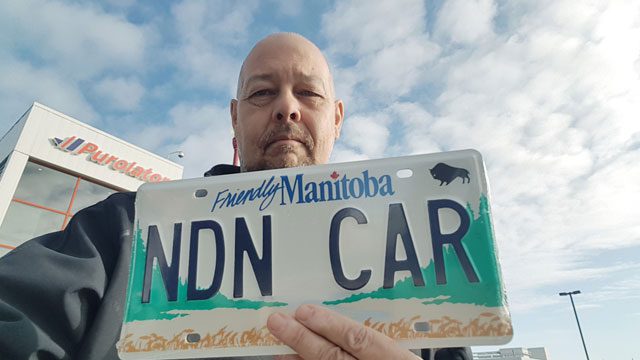
A Cree man in Winnipeg will once again ride his “NDN CAR.”
Bruce Spence had his personalized license plate returned to him Thursday morning – following months of negotiating with Manitoba Public Insurance (MPI).
“I was surprised when I realized MPI was serious about taking the plates away. I’m even more surprised that they decided to give it back without a fight,” Spence said after MPI returned the plates.
“NDN CAR” vanity plate about seven years ago from MPI, the Crown corporation in Manitoba that issues license plates among other things.
In February, Spence received a letter from the Crown corporation’s Licensing Services Department stating the plate was “prohibited, as per our guidelines,” because it had been “identified as a phrase or innuendo that may be considered offensive.”
Read More:
First Nation man told to lose ‘NDN CAR’ license plate
Constitutional challenge may help NDN CAR ride again
Spence, who is a producer at APTN News, was instructed to “surrender” the plate.
The vanity plate is a nod to the popular folk rock tune Indian Cars by Keith Secola and the Wild Band of Indians.
“I didn’t know how it could be offensive,” Spence said at the time. “Everybody in Indian Country knows that song.”
After coming forward with his case, Spence was contacted by the Justice Centre for Constitutional Freedoms (JCFF), a Calgary-based legal advocacy organization specializing in Canadian constitutional law, who offered to represent him at no cost.
Spence with the help from JCCF challenged the decision before the courts citing MPI’s decision to revoke the plate violated his freedom of expression as protected by section 2(b) of the Canadian Charter of Rights and Freedoms, the JCCF said in a statement released Thursday morning.
“As a government body, MPI is precluded from violating the freedom of expression rights of vehicle owners who chose, in response to MPI’s invitation to do so, to express themselves on personalized license plates,” said James Kitchen, a lawyer with the JCCF.
“It cannot revoke personalized plates simply to avoid controversy or to appease someone who has complained because they feel offended by a particular personalized plate.”
MPI previously said they received a complaint about the plate and followed policy to determine if it was offensive.
“The registered owner provided us with additional information and explanation as to the importance and the meaning of the plate to him and gave us some additional background. We also reached out to the Truth and Reconciliation Commission regarding the word ‘Indian,’” MPI spokesperson Brian Smiley told APTN Thursday.
“Taking all that information into account it was determined that the plate could be returned back to the registered owner. We wanted to get this right and it took some time but due diligence often takes some time.”
Kitchen called the decision a “victory” for freedom of expression in Canada.
This is a sentiment Spence agrees with: “This was a free speech issue. In the end, the right to say reasonable things in public won out.”











